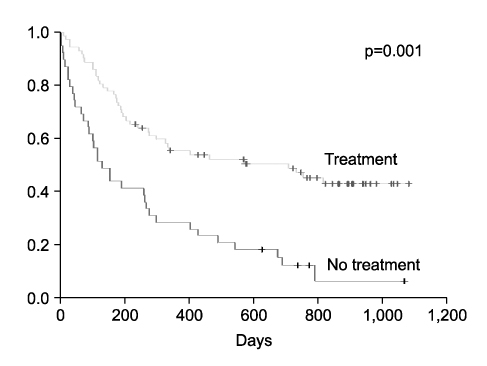Tuberc Respir Dis.
2008 Jul;65(1):15-22. 10.4046/trd.2008.65.1.15.
The Clinical Characteristics and Prognosis of Elderly Patients with Lung Cancer Diagnosed in Daegu and Gyeongsangbukdo
- Affiliations
-
- 1Department of Internal Medicine, College of Medicine, Catholic University of Daegu, Korea. hdsomn@cu.ac.kr
- 2Department of Internal Medicine, College of Medicine, Kyungpook National University, Korea.
- 3Department of Internal Medicine, College of Medicine, Yeungnam University, Korea.
- 4Department of Internal Medicine, College of Medicine, Keimyung University, Korea.
- 5Department of Internal Medicine, Daegu Fatima Hospital, Korea.
- 6Department of Internal Medicine, College of Medicine, Soonchunhyang University, Gumi, Korea.
- KMID: 1478211
- DOI: http://doi.org/10.4046/trd.2008.65.1.15
Abstract
-
BACKGROUND: Lung cancer is the leading cause of cancer death in South Korea since the year 2000 and it is more common in elderly patients, with a peak incidence at around 70~80 years of age. However, these elderly patients receive treatment less often than do the younger patients because of organ dysfunction related to their age and their comorbidities, and they show poor tolerance to chemotherapy. The aims of this study were to analyze the clinical characteristics and treatment-related survival of elderly patients with lung cancer.
METHODS
In this retrospective study, we analyzed the clinical data of 706 lung cancer patients who were diagnosed at hospitals in Daegu and Gyeongsangbukdo from January 2005 to December 2005. We compared the clinical characteristics and outcomes of the patients who were aged 70 years and older (elderly patients) with those clinical characteristics and outcomes of the younger individuals.
RESULTS
The median age of the patients was 68 years (from 29 to 93) and the elderly patients were 38.7% (n=273) of all the study's patients. Squamous cell carcinoma was the most common type of lung cancer in both the elderly and younger patient groups. Elderly patients had more symptoms of dyspnea and chronic obstructive pulmonary disease (COPD) than the younger patients (p<0.001 and p<0.001, respectively). A good performance status (ECOG 0-1) was less common for the elderly patients (p<0.001). The median survival of the non-small cell lung cancer (NSCLC) patients was significantly higher in the younger patient group than in the elderly patient group (962 days vs 298 days, respectively, p=0.001). However, the median survival of the NSCLC patients who received any treatment showed no significant difference between the younger patient group and the elderly patient group (1,109 days vs 708 days, respectively, p=0.14).
CONCLUSION
Our data showed that appropriate treatment for selected elderly patients improved the survival of patients with NSCLC. Therefore, elderly NSCLC patients with a good performance status should be encouraged to receive appropriate treatment.
Keyword
MeSH Terms
Figure
Reference
-
1. Korea National Statistical Office. Statistics on the aged. 2005. Daejeon: Korea National Statistical Office.2. Gridelli C, Maione P, Comunale D, Rossi A. Adjuvant chemotherapy in elderly patients with non-small-cell lung cancer. Cancer Control. 2007. 14:57–62.3. Korean Cancer Registry. Annual report of the Korean Cancer Registry. 2002. Seoul: Ministry of Health and Welfare.4. Ryu JS, Lee HJ, Leem JH, Kim L, Lee KH, Cho JH, et al. Clinical characteristics of primary lung cancer patients in a tertiary hospital. Tuberc Respir Dis. 2006. 60:321–329.5. Kim YC, Kwon YS, Oh IJ, Kim KS, Kim SY, Ryu JS, et al. National survey of lung cancer in Korea, 2005. J Lung Cancer. 2007. 6:67–73.6. Woo CM, Kim SY, Lee SA, Oh HJ, Bae SH, Ryoo HM, et al. Paclitaxel for elderly patients with advanced NSCLC. Korean J Med. 2006. 70:183–189.7. Gridelli C, Perrone F, Gallo C, Cigolari S, Rossi A, Piantedosi F, et al. Chemotherapy for elderly patients with advanced non-small-cell lung cancer: the Multicenter Italian Lung Cancer in the Elderly Study (MILES) phase III randomized trial. J Natl Cancer Inst. 2003. 95:362–372.8. Schild SE, Stella PJ, Geyer SM, Bonner JA, McGinnis WL, Mailliard JA, et al. The outcome of combined-modality therapy for stage III non-small-cell lung cancer in the elderly. J Clin Oncol. 2003. 21:3201–3206.9. Altundag O, Stewart DJ, Fossella FV, Ayers GD, Wei W, Zhou X, et al. Many patients 80 years and older with advanced non-small cell lung cancer (NSCLC) can tolerate chemotherapy. J Thorac Oncol. 2007. 2:141–146.10. Spaggiari L, Scanagatta P. Surgery of non-small cell lung cancer in the elderly. Curr Opin Oncol. 2007. 19:84–91.11. Mountain CF. Revisions in the International System for Staging Lung Cancer. Chest. 1997. 111:1710–1717.12. Korea National Statistical Office. Death cause statistics of Korea. 2005. Daejeon: Korea National Statistical Office.13. Scienticfic Committee of Korean Academy of Tuberculosis and Respiratory Diseases. The national survey of lung cancer in Korea. Tuberc Respir Dis. 1999. 46:455–465.14. Lee-Chiong TL Jr, Matthay RA. Lung cancer in the elderly patient. Clin Chest Med. 1993. 14:453–478.15. Brown JS, Eraut D, Trask C, Davison AG. Age and the treatment of lung cancer. Thorax. 1996. 51:564–568.16. Montella M, Gridelli C, Crispo A, Scognamiglio F, Ruffolo P, Gatani T, et al. Has lung cancer in the elderly different characteristics at presentation? Oncol Rep. 2002. 9:1093–1096.17. Zagonel V, Pinto A, Serraino D, Babare R, Sacco C, Merola MC, et al. Lung cancer in the elderly. Cancer Treat Rev. 1994. 20:315–329.
- Full Text Links
- Actions
-
Cited
- CITED
-
- Close
- Share
- Similar articles
-
- Clinical Characteristics of Patients Older than 76 with Lung Cancer
- Clinical implications of idiopathic pulmonary fibrosis and lung cancer
- Anti-Cancer Therapy of Advanced Lung Cancer in Elderly Patients
- Characteristics of Lung Cancer in the Elderly
- The Clinical Characteristics in Patients with Lung Cancer Under 45 Years of Age






